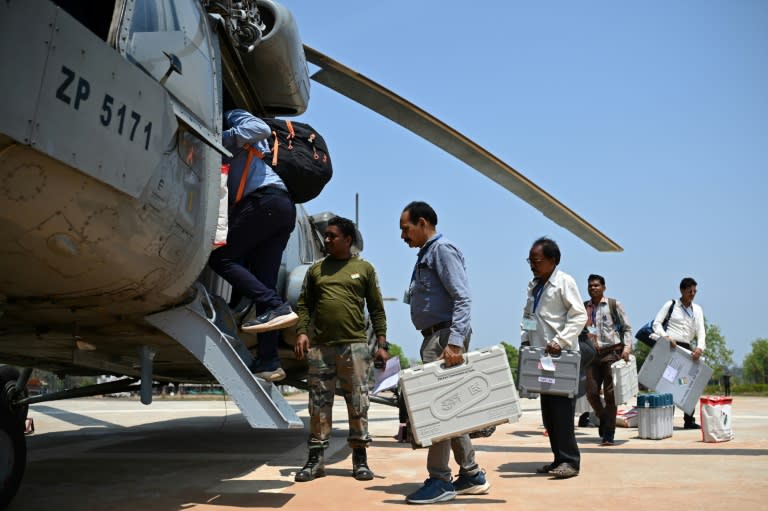Hindu nationalist Modi the favourite as India votes

- Oops!Something went wrong.Please try again later.
India began voting Friday in a six-week election with an all but assured victory for Hindu nationalist Prime Minister Narendra Modi, as a weakened opposition is pushed to the sidelines.
A total of 968 million people are eligible to take part in the world's biggest vote -- a staggering logistical exercise that critics say follows a concerted effort to delegitimise rivals.
A long and winding queue was patiently assembled outside a polling station in the Hindu holy city of Haridwar, on the banks of the Ganges river, even before the booths opened.
"Modi had ensured our country as well as our faith is secure," 59-year-old Hindu ascetic Uday Bharti told AFP outside a polling station.
"We have come here to make sure Modi keeps doing his good work."
Modi, 73, remains resoundingly popular after a decade in office that has seen India rise in diplomatic clout and economic power, as well as efforts by his government to bring the country's majority faith in ever closer alignment with its politics.
"I urge all those voting... to exercise their franchise in record numbers," he wrote in a post on X as the election began.
"Every vote counts and every voice matters!"
Modi has already led the ruling Bharatiya Janata Party (BJP) through two landslide victories in 2014 and 2019, forged in large part by his appeal to the Hindu faithful.
This year, he presided over the inauguration of a grand temple to the deity Ram, built on the grounds of a centuries-old mosque razed by Hindu zealots.
Construction of the temple fulfilled a long-standing demand of Hindu activists and was widely celebrated across India with back-to-back television coverage and street parties.
- 'We have no money' -
Analysts have long expected Modi to triumph against a fractious alliance of more than two dozen parties that have yet to name a candidate for prime minister.
His prospects have been further bolstered by several criminal probes into his opponents and a tax investigation this year that froze the bank accounts of Congress, India's largest opposition party.
"We have no money to campaign, we cannot support our candidates," Rahul Gandhi, the most prominent Congress leader, told reporters in March.
"Our ability to fight elections has been damaged."
Opposition figures and human rights organisations have accused Modi's government of orchestrating the probes to weaken rivals.
Modi's tenure has seen India overtake former colonial ruler Britain as the world's fifth-biggest economy, and Western nations lining up to court a prospective ally against regional rival China's growing assertiveness.
In doing so, they have sidestepped concerns over the taming of India's once-vibrant press and restrictions on civil society that have seen rights groups such as Amnesty severely curtail their local operations.
Last year, the tax office raided the BBC's local offices weeks after the British broadcaster aired a documentary questioning Modi's role in the 2002 religious riots that killed around 1,000 people, most of them Muslims.
Modi's time in office had seen "a pattern of repression to undermine democracy and civic space", rights group CIVICUS said in a Wednesday report.
While India is constitutionally secular, the country's 220 million-strong Muslim community and other minorities have felt threatened by the rise of Hindu nationalist fervour.
"They have polarised along religious lines so much that there is no trust left between Hindus and Muslims," restaurant owner Abdul Basit, 25, told AFP at a restaurant in the city of Muzaffarnagar.
- 'Hatred and injustice' -
Modi's BJP is challenged by an alliance of more than two dozen parties.
Gandhi -- the scion of India's most famous political dynasty, whose father, grandmother and great-grandfather all served as prime minister -- was briefly disqualified from parliament last year after being convicted of criminal libel.
The 53-year-old has criticised the government for democratic backsliding, failing to create jobs for India's millions of out-of-work youth, and its chest-thumping Hindu nationalism.
"Your one vote can put an end to inflation, unemployment, hatred and injustice," his party said on X.
But Gandhi has already led Congress to two defeats against Modi and his efforts to dent the premier's popularity have failed to register with voters.
Published opinion polls are rare in India, but a Pew survey last year found Modi was viewed favourably by nearly 80 percent of the public.
Voting on Friday was mostly without incident, but one polling station in conflict-hit Manipur was ransacked after unknown assailants let off gunfire outside.
The far-flung state has fractured along ethnic lines after fighting broke out last year between the predominantly Hindu Meitei majority and the mainly Christian Kuki community, displacing thousands.
Voting in the first phase closed at 6 pm India time (1230 GMT), with six more rounds between April 26 and June 1 to come.
Ballots will be counted all at once on June 4 and are usually announced on the same day.
sai-abh/gle/qan

